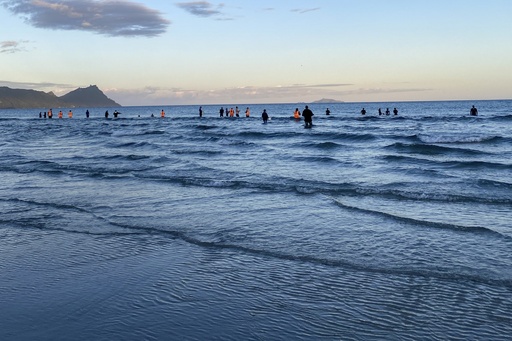
WELLINGTON, New Zealand — A group of over 30 pilot whales that found themselves stranded on a New Zealand beach was successfully guided back into the ocean thanks to the collaborative efforts of conservation workers and local residents, who assisted in refloating them using sheets. Unfortunately, four of the whales did not survive the incident, as reported by New Zealand’s conservation agency.
New Zealand is known for being a prominent site for whale strandings, with pilot whales being particularly prone to this occurrence. On Monday, a monitoring team was positioned at Ruak?k? Beach close to Whang?rei to ensure that the rescued whales did not re-strand, according to the Department of Conservation. The agency praised the remarkable efforts of hundreds of volunteers who came together to rescue the stranded pod.
“It’s fantastic to see the genuine care and compassion that people have extended toward these magnificent animals,” stated Joel Lauterbach, a spokesperson for the Department of Conservation. “This response highlights the profound connection we have with our marine environment.”
In honor of the three adult whales and one calf that lost their lives during the stranding, a M?ori cultural ceremony was held on Monday. The Indigenous people of New Zealand regard whales as a taonga, or sacred treasure, celebrating their cultural importance.
Since 1840, New Zealand has witnessed more than 5,000 recorded whale strandings. Notably, the largest recorded incident involved approximately 1,000 pilot whales on the Chatham Islands in 1918, as indicated by the Department of Conservation.
While the exact reasons for whale strandings remain unclear, the unique geography of New Zealand is suspected to play a significant role. Both the North and South Islands feature extensive coastlines with shallow, sloping beaches, which can disorient pilot whales and other species that navigate using echolocation.
